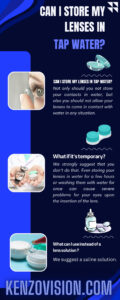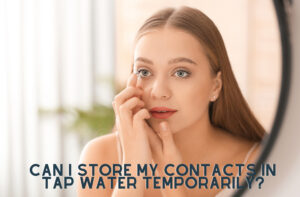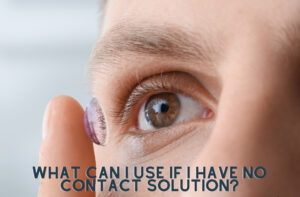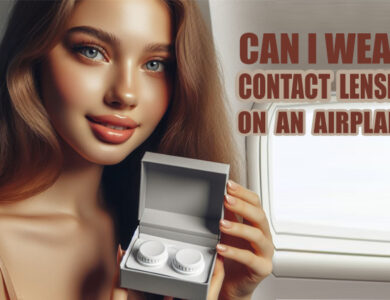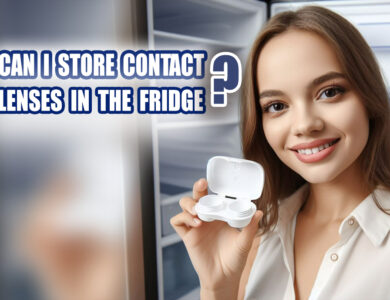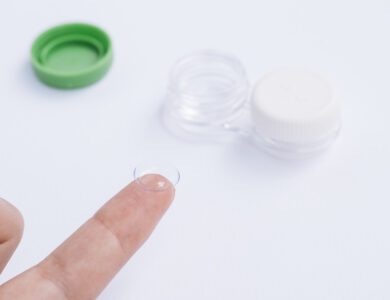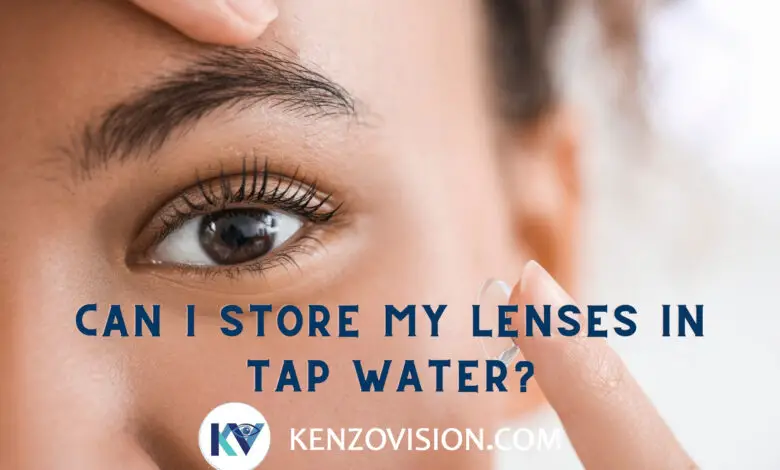
No, never put your contacts in tap water. Storing your contacts in water instead of a contact lens solution can seriously harm your eyes and contact lenses.
That’s because there are a lot of bacteria and viruses that live in tap water and can cause significant eye infections, So we recommend you use contact lens solution.
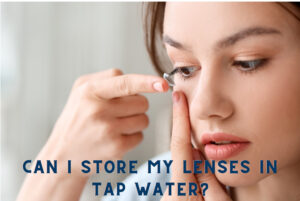
Can I store my lenses in tap water?
Not only should you not store your contacts in water, but also you should not allow your lenses to come in contact with water in any situation.
This means you can’t shower or swim while wearing contacts. You may ask what the problem is between contact lenses and water.
The answer is that water contaminates your lenses with various microbes and small substances. Generally, water contains millions of microorganisms and Pathogens and other kinds of tiny particles that, upon coming in contact with your lenses, will contaminate them, and if you put contaminated lenses in your eyes, you are risking eye infection and other critical vision-threatening problems.
So, following your eye care professional orders and storing your contacts in lens solutions is essential.
Can I store My Contacts In Tap Water Temporarily?
You may ask “What if I only want to put my contacts in water for a few hours or wash my lenses with water for one time?” We strongly suggest that you don’t do that.
Even storing your lenses in water for a few hours or washing them with water for once can cause severe problems for your eyes upon the insertion of the lens. As we said, microorganisms in water are numerous, making letting water come in contact with your lenses look like a massive gamble on your eye health.
If you want to avoid eye infections, irritation, and vision-threatening problems, always use lens solutions for storing and cleaning your contacts; if your contacts accidentally come into contact with water, take them out and properly clean them before using them again.

What happens if you put your lenses in tap water?
If you put your lenses in tap water, the microbes and other microorganisms in water will contaminate your contacts with germs that can lead to eye infections. These microbes even can cause corneal infections that are very hard to cure and can cause blindness.
As you see, the risks are not small with water and contact lenses, so we recommend being careful and following the contact lens care guidelines to ensure you keep your eyes healthy.
What Can I Use If I Have No Contact Solution?
We suggest a saline solution if you want to know what you can use instead of lens solutions for storing your contacts.
Although saline solutions don’t contain cleaning agates like lens solutions, they are a good alternative when you don’t have access to multipurpose lens solutions.
FAQs: Can I Store My Lenses in Tap Water?
Q: Is it safe to store contact lenses in tap water?
A: You shouldn’t put your lenses in tap water or even let your contacts come into contact with water.
Tap water contains microorganisms and all kinds of microbes that, when you allow your lenses to come into contact with them, can cause severe eye infections, including microbial keratitis.
Also, pathogens in tap water can cause discomfort, redness, and potential vision-threatening complications upon inserting the lenses.
Q: What are the dangers of storing lenses in tap water?
A: As we said, tap water containing microorganisms and other small particles harmful to your eyes and your lenses is not a good choice for storing your contacts.
If you do so, you make your eyes prone to the danger of severe eye infections and symptoms like discomfort, redness, and potential vision-threatening complications
Q: How should contact lenses be appropriately stored?
A: To ensure your lenses stay safe and clean, you should use the lens solution your eye doctor recommended for cleaning and storing your lenses. Avoid using homemade solutions and water, as they are not an option.
Q: Can using tap water to store lenses lead to eye infections?
A: Storing contact lenses in tap water significantly increases the risk of eye infections due to the presence of microorganisms that can cause microbial contamination.
Q: What should I do if my lenses come into contact with tap water?
A: If contact lenses come into contact with tap water accidentally, removing and disinfecting them immediately using a sterile contact lens solution is crucial. Avoid wearing the lenses until they have been adequately cleaned and disinfected.
Q: Can tap water be used for rinsing contact lenses?
A: Tap water should never be used for rinsing contact lenses as it is non-sterile and can introduce harmful microorganisms.
Contact lens wearers should only use sterile saline or multipurpose contact lens solution recommended by their eye care provider for rinsing and cleaning to maintain eye health and prevent infections.
Storing contact lenses in tap water is unsafe and poses severe risks to eye health. To ensure that your lenses stay clean and safe to use, always stick to the multipurpose solution that your eye care professional recommended to you, and if you do not have access to it, use saline solution instead.
Prioritizing eye health by following the recommended guidelines for contact lens care can help prevent infections and maintain optimal vision clarity. Remember, when it comes to contact lens care, always prioritize safety, cleanliness, and following professional recommendations for maintaining healthy and happy eyes.
